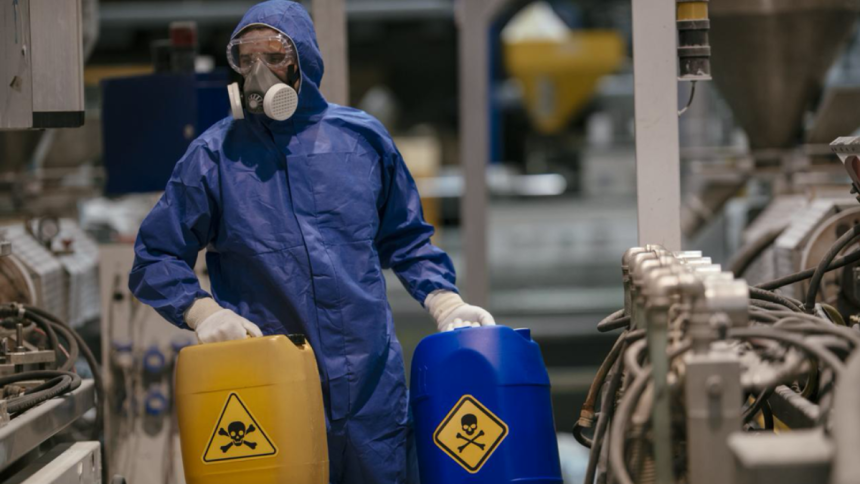For many small businesses, the default mindset is scrappy, hands-on, and budget-conscious. That’s part of the appeal. When the printer jams, the owner fixes it. When there’s a flood in the basement, they’re the one rolling up their sleeves with a shop vac. But hazardous waste? That’s where good intentions can go sideways fast.
The problem is simple. Most small business owners don’t realize they’re generating hazardous waste in the first place. Whether it’s solvents from an auto shop, expired chemicals in a school science lab, or biohazards in a boutique medspa, the risks add up quickly. What seems like “just a little mess” in a utility closet might be enough to trigger thousands in fines—or worse, long-term environmental damage that the company ends up legally on the hook for.
And while large corporations have compliance officers and long-term vendor contracts in place to avoid this kind of fallout, small operations often try to wing it. That’s when things get expensive.
Why The Stakes Are Higher Than They Look
One of the biggest issues in hazardous waste management is that the rules don’t flex just because a business is small. The same regulations that apply to sprawling manufacturing plants also apply to the mom-and-pop dry cleaner down the street. The difference? One has a legal team and environmental compliance manager. The other is usually just trying to keep payroll covered.
What ends up happening is an uneven playing field. Bigger businesses bake compliance into their operating costs and can absorb the hit when something goes wrong. Smaller businesses often don’t even know what qualifies as hazardous waste, let alone how to store, label, or dispose of it properly. That lack of knowledge isn’t just risky—it’s punishable.
A common mistake is storing old chemicals or containers past their expiration date “just in case,” or disposing of them down drains or in regular trash bins. Both practices are not only illegal but can contaminate local water supplies and landfills. Cleanup costs are no joke, and environmental agencies tend to come down hard on businesses, even for first-time violations.
The High Cost of Skipping the Pros
If the idea of calling in a professional to manage waste sounds expensive, it’s only because most people haven’t seen the financial wreckage that happens when they don’t. The cost of remediation after a spill or improper disposal can bankrupt a business in months.
That’s where decontamination services come in. They’re not just for big oil spills or crime scenes—although they handle those, too. These services work with all types of businesses to safely remove, treat, and dispose of hazardous materials, often preventing accidents that would otherwise go unnoticed until they turn into a legal or environmental nightmare.
The truth is, most small business owners think a cleanup crew only needs to show up after something bad happens. But the best time to call is before anything goes wrong. Many firms now offer routine maintenance and compliance checks for surprisingly affordable rates, especially compared to the five or six figures a cleanup might cost after the fact.
Who’s Liable? Spoiler: You Are
One of the more sobering realities of hazardous waste disposal is the legal responsibility that follows it. Even if a business hires a third-party hauler to take it away, liability often still sits squarely with the original generator—the small business. That’s right. If the hauler cuts corners, dumps it illegally, or has an accident on the way to a facility, your name is still on the paperwork.
This is why it matters who you partner with. Companies that specialize in proper documentation, certified disposal routes, and detailed tracking logs are worth their weight in gold. Not just because they protect the environment, but because they keep your business off the legal radar when something inevitably goes sideways in transit.
It’s also worth noting that some industries are being watched more closely now. The rise of micro-labs, mobile beauty businesses, and boutique health practices has introduced more points of risk. Many of these newer business models operate without a deep understanding of compliance, which means they often get flagged first when regulators make their rounds.
Better Waste Management Isn’t Just About Avoiding Fines
There’s an environmental argument here, too, and it’s one that doesn’t always get airtime in business circles. Managing waste responsibly isn’t just about avoiding lawsuits or keeping inspectors happy. It’s about operating in a way that doesn’t leave a mess for the next generation.
Businesses of all sizes have a role to play in sustainability. That includes thinking about how day-to-day operations contribute to larger issues like soil contamination, groundwater pollution, and air quality degradation. It’s easy to dismiss a single box of expired chemicals or a few leaky drums of cleaning solvents as inconsequential, but they don’t stay small once they seep into a storm drain or catch fire.
Investing in smarter, more transparent healthcare waste strategies or industrial disposal methods can also boost a company’s reputation. Consumers care about this now. They want to support brands that aren’t trashing the environment behind the scenes. In a competitive market, transparency on waste management practices isn’t just responsible—it’s good PR.
Toxic Waste, Tiny Teams, and a Ton of Oversight
There’s a strange gap in perception around industrial and hazardous waste. It’s seen as the domain of refineries, factories, and huge labs. But the reality is much smaller and far more common. Even a school janitor’s closet, a boutique tattoo studio, or a nail salon can accumulate materials that count as hazardous under federal law.
The gap between perception and reality is where the problems start. It’s easy for a small business to assume the rules don’t apply because their footprint is modest. But regulators don’t grade on a curve. If something goes wrong, ignorance isn’t a defense.
That’s why education is key. Vendors that specialize in small-business-friendly hazardous waste management often offer free assessments, guidance on compliance, and low-cost pickup plans. But owners have to be willing to ask. The resources are out there—the bigger risk is pretending the problem doesn’t exist.
Hazardous waste doesn’t care how big your business is. Whether you’re running a local print shop or a growing medspa, the responsibility is the same. Taking the time to understand that—and partnering with the right cleanup experts—isn’t just smart. It’s necessary.
Lynn Martelli is an editor at Readability. She received her MFA in Creative Writing from Antioch University and has worked as an editor for over 10 years. Lynn has edited a wide variety of books, including fiction, non-fiction, memoirs, and more. In her free time, Lynn enjoys reading, writing, and spending time with her family and friends.















